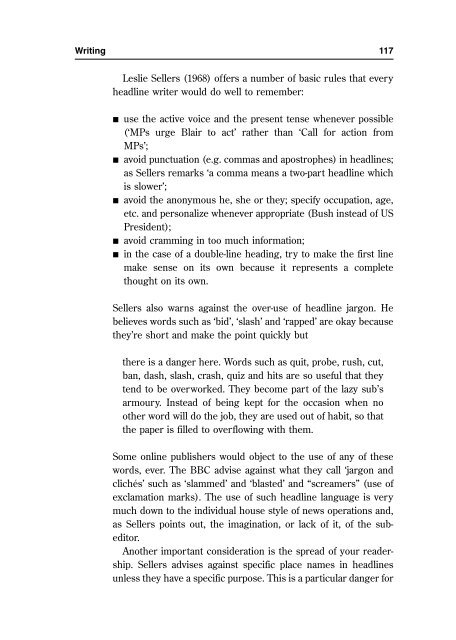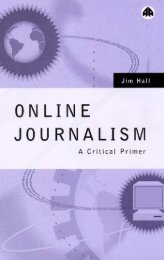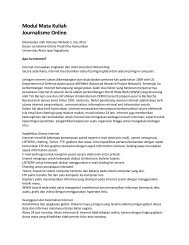1What is online journalism? - Ayo Menulis FISIP UAJY
1What is online journalism? - Ayo Menulis FISIP UAJY
1What is online journalism? - Ayo Menulis FISIP UAJY
You also want an ePaper? Increase the reach of your titles
YUMPU automatically turns print PDFs into web optimized ePapers that Google loves.
Writing 117<br />
Leslie Sellers (1968) offers a number of basic rules that every<br />
headline writer would do well to remember:<br />
use the active voice and the present tense whenever possible<br />
(‘MPs urge Blair to act’ rather than ‘Call for action from<br />
MPs’;<br />
avoid punctuation (e.g. commas and apostrophes) in headlines;<br />
as Sellers remarks ‘a comma means a two-part headline which<br />
<strong>is</strong> slower’;<br />
avoid the anonymous he, she or they; specify occupation, age,<br />
etc. and personalize whenever appropriate (Bush instead of US<br />
President);<br />
avoid cramming in too much information;<br />
in the case of a double-line heading, try to make the first line<br />
make sense on its own because it represents a complete<br />
thought on its own.<br />
Sellers also warns against the over-use of headline jargon. He<br />
believes words such as ‘bid’, ‘slash’ and ‘rapped’ are okay because<br />
they’re short and make the point quickly but<br />
there <strong>is</strong> a danger here. Words such as quit, probe, rush, cut,<br />
ban, dash, slash, crash, quiz and hits are so useful that they<br />
tend to be overworked. They become part of the lazy sub’s<br />
armoury. Instead of being kept for the occasion when no<br />
other word will do the job, they are used out of habit, so that<br />
the paper <strong>is</strong> filled to overflowing with them.<br />
Some <strong>online</strong> publ<strong>is</strong>hers would object to the use of any of these<br />
words, ever. The BBC adv<strong>is</strong>e against what they call ‘jargon and<br />
clichés’ such as ‘slammed’ and ‘blasted’ and “screamers” (use of<br />
exclamation marks). The use of such headline language <strong>is</strong> very<br />
much down to the individual house style of news operations and,<br />
as Sellers points out, the imagination, or lack of it, of the subeditor.<br />
Another important consideration <strong>is</strong> the spread of your readership.<br />
Sellers adv<strong>is</strong>es against specific place names in headlines<br />
unless they have a specific purpose. Th<strong>is</strong> <strong>is</strong> a particular danger for
















